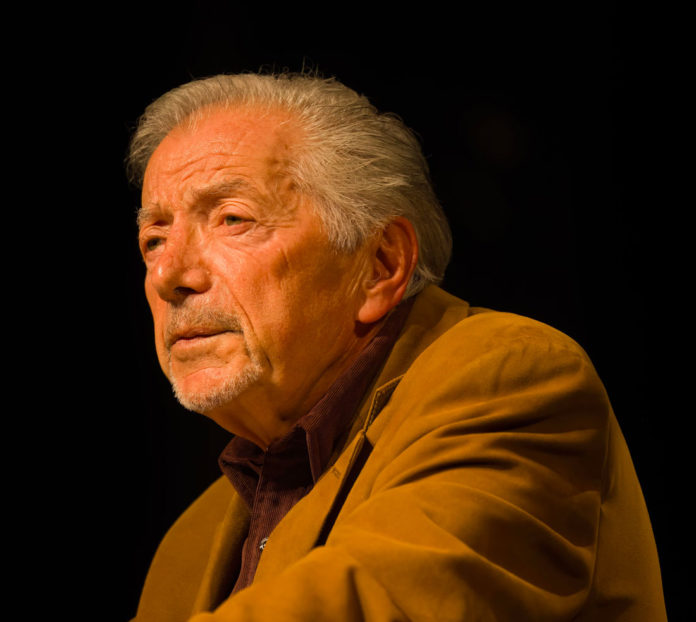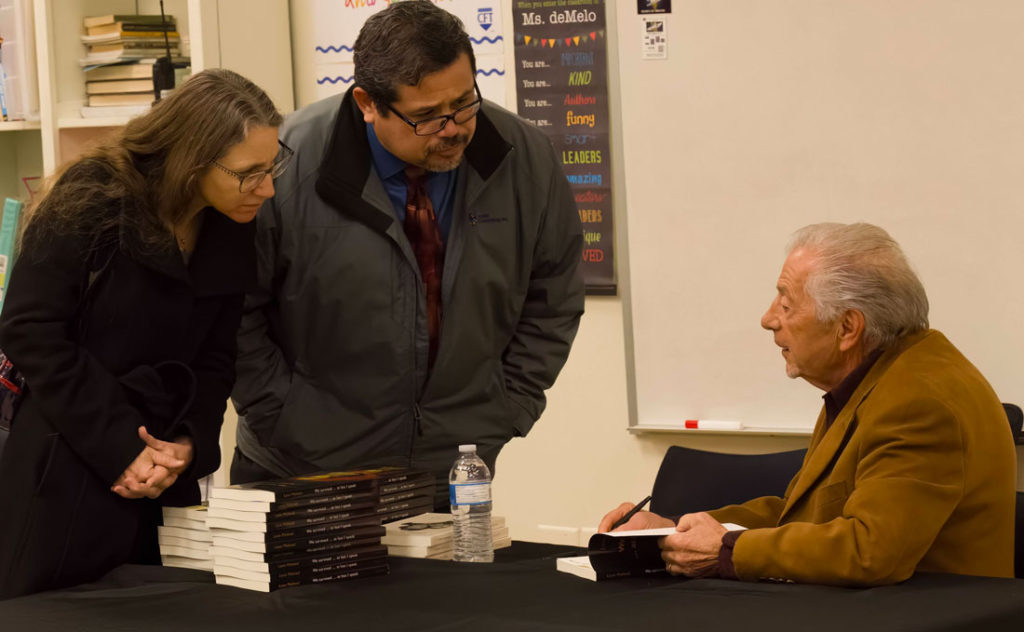
The only memory Leon Malmed, 86, has of his parents was a tragic moment in July 1942, when French police—acting under orders of the country’s Nazi German occupiers—showed up at his family’s home to arrest the adults for being Jewish. It was also the last time that Malmed, who was just barely 4 years old, would ever see his parents.
“I remember holding my mother’s skirt as the French police were pushing them down two flights of stairs,” Malmed said at a Jan. 11 presentation at Live Oak High School Theater in Morgan Hill. “On that day, Henri and Suzanne Riboleau, Catholic, our neighbors from the apartment below, offered to take my sister and me, not knowing of course that they would have to keep us for the next three years.”
Malmed and his sister, Rachel, hid out with the neighbors until American and allied troops liberated France in 1945, in a careful and determined effort to avoid being captured and likely executed by the Nazi regime. Ultimately, the Nazis killed about 6 million Jews during what is now known as the Holocaust, which included widespread imprisonment and execution of Jews and other groups in concentration camps throughout Europe.
During the occupation, the Riboleau family sheltered the children through many close calls, air raids, roundups and other threats posed by the Nazis—including a lingering fear that other neighbors would reveal their location in exchange for food ration cards at a time when many were starving. Laws imposed by the Nazis prohibited Jews from entering any public properties, businesses or facilities in occupied areas.

Leon Malmed shared these and other details of his frightening early childhood experience at the Jan. 11 presentation, which was organized by the Chabad Jewish Center of South County. Malmed noted that he is forever grateful to the Riboleau family, whose descendants he remains in contact with today.
“I lived with four adults we hardly knew—24/7, scared of bombs and arrest and starving, and being taken away by the enemy,” Malmed told an audience of more than 400 in Morgan Hill. “I am a messenger and a witness of what the Second World War and the Holocaust have done to my family…and to the world.”
The Jan. 11 event included a reception before the speaking presentation, in which Malmed met with local residents and signed copies of the book he wrote about his survival experience, “We survived…at last I speak.”
Chabad Jewish Center Director Rabbi Mendel Liberow said during his introduction of Malmed that it is important to keep stories like his alive as proof that good can triumph over evil, and to arm civilization with the knowledge to avoid catastrophes like the Holocaust in the future.
“It’s our obligation to learn from history to ensure that it doesn’t (repeat itself) and that’s why it’s so important that we’re here tonight to learn about the Holocaust,” Liberow said. “The evil and darkness overwhelms everything. But the survivors represent the courage, the light of overcoming the darkness. They held onto hope no matter how difficult it was.”
The event’s originally scheduled speaker, 101-year-old Joseph Alexander—who survived 12 concentration camps during the Holocaust—was unable to attend Jan. 11 due to a family medical emergency, Liberow said. Nevertheless, local interest in the event was so overwhelming that organizers had to change venues from the Community Playhouse to the Live Oak theater, which is the largest auditorium in Morgan Hill.
Officials from the cities of Morgan Hill and Gilroy spoke briefly on Jan. 11, also highlighting the importance of continuing to educate children and future generations about the Holocaust.
“We recognize the importance of promoting equity, tolerance and human rights, and we are committed to fostering an inclusive community that values diversity and the fundamental principles of equality and justice,” Gilroy City Councilmember Carol Marques said on behalf of the city council. “Together let’s ensure that the lessons of the Holocaust resonate with us always, and that they guide us to a more compassionate and just world.”

Liberow added that Malmed has not always been so open to telling his story from the Holocaust. He didn’t publish his book until 2013, but Malmed is now committed to spreading knowledge of the sordid history of the Holocaust through regular speaking engagements and interviews.
“We had survived some of the darkest days of human history,” Malmed said Jan. 11. “We waited at the time with great anticipation for the return of our parents. It took a long time to accept that we would never see them again.”
Malmed and his sister later learned that after their parents’ arrest at home in 1942, they were detained at concentration camps in Drancy, France, and later at Auschwitz-Birkenau—from where they never returned.
Leon and Rachel Malmed immigrated to the U.S. in the years after the war—Leon in 1964, when he embarked on his career in the high tech industry in Silicon Valley.
“Once more in the history of the planet and fortunately for humanity, goodness triumphed over evil,” Malmed said in Morgan Hill. “I am a witness of the tragedy. As we continue to live in a turbulent and uncertain world, we should wonder if humanity has learned anything from history. Racism, antisemitism and hate are still present today.”
He added, “We cannot be silent. Our educators, our religious leaders and our elected officials must remind us of the tragic events of a war like World War Two… We must be reminded of the catastrophes due to racism, antisemitism, religious hatred and wars that have brought havoc, death and misery to so many innocents and their families for centuries.”









